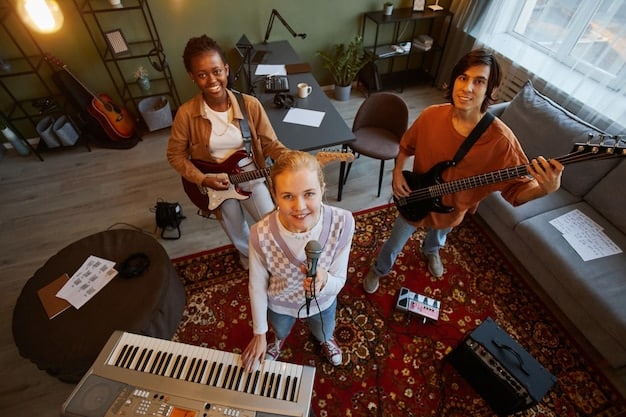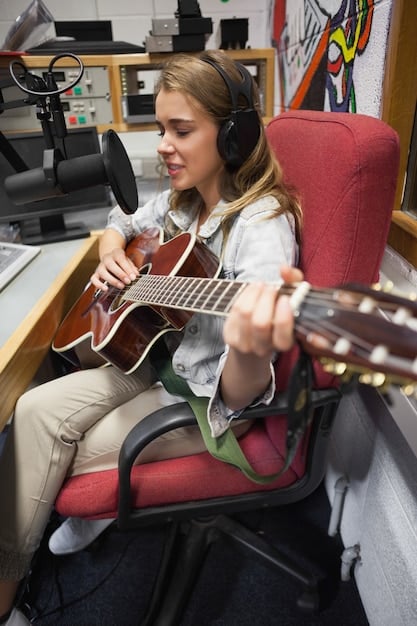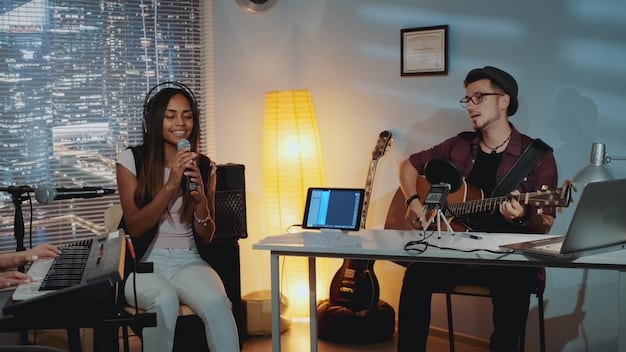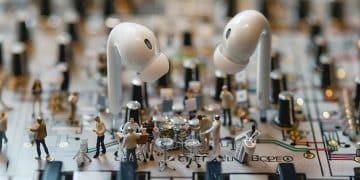The Future of Music Education: Underground Rap’s Influence

The Future of Music Education: How Underground Rap is Shaping the Next Generation of Artists explores the transformative impact of underground rap on music education, highlighting its influence on creativity, cultural awareness, and innovative teaching methodologies, particularly within marginalized communities.
The world of music education is constantly evolving, and one of the most surprising catalysts for change is underground rap. This dynamic and often misunderstood genre is making significant waves, influencing how music is taught and learned, and shaping the next generation of artists. Understanding The Future of Music Education: How Underground Rap is Shaping the Next Generation of Artists is crucial for educators, musicians, and anyone interested in the cultural shifts happening in music today.
The Rise of Underground Rap in Music Education
Underground rap, characterized by its raw authenticity and lyrical complexity, has found an unlikely home in music education. Its influence extends beyond mere entertainment, offering valuable insights into cultural expression and artistic innovation. This section explores how underground rap is being integrated into educational curricula.
Understanding the Roots of Underground Rap
Underground rap often reflects the realities of marginalized communities, providing a platform for voices that are typically unheard. Its integration into music education allows students to engage with diverse perspectives and challenge conventional norms.
The Educational Value of Lyrical Analysis
Analyzing the lyrics of underground rap songs encourages critical thinking and enhances students’ understanding of poetic devices and storytelling techniques. This process can be just as enriching as studying classic literature.
- Exploring diverse cultural narratives.
- Enhancing critical thinking skills through lyrical analysis.
- Understanding poetic devices and storytelling techniques.
- Promoting inclusivity and awareness in the classroom.
Incorporating underground rap into music education provides a unique opportunity to connect with students on a deeper level. By acknowledging and celebrating their cultural backgrounds, educators can foster a more inclusive and engaging learning environment. This approach not only enriches their understanding of music but also empowers them to express themselves authentically.

Breaking Down Traditional Music Education Barriers
Traditional music education often focuses on classical forms and established methods, which may not resonate with all students. Underground rap offers an alternative pathway, one that embraces contemporary sounds and encourages experimentation. This section examines how incorporating rap challenges these traditional barriers.
Challenging Eurocentric Music Curricula
Introducing underground rap allows educators to challenge the dominance of Eurocentric music curricula and broaden students’ exposure to different musical traditions and cultural contexts. This promotes a more inclusive and diverse understanding of music history.
Encouraging Creativity and Self-Expression
Underground rap often emphasizes originality and self-expression, which can inspire students to explore their own creativity and develop their unique artistic voices. It encourages them to think outside the box and push the boundaries of traditional music composition.
- Promoting a more inclusive and diverse understanding of music.
- Encouraging students to explore their own creativity.
- Breaking away from rigid classical forms.
- Fostering a more personalized approach to learning music.
By incorporating underground rap into music education, educators can break down barriers and create a more accessible and engaging learning environment for all students. This approach not only enriches their understanding of music but also empowers them to express themselves authentically, fostering a more personalized and inclusive educational experience.
The Technical Skills Learned Through Rap Production
Producing underground rap music involves a range of technical skills, from beat-making to mixing and mastering. These skills are highly transferable and can prepare students for careers in the music industry and beyond. This section delves into the technical skills acquired through rap production.
Mastering Digital Audio Workstations (DAWs)
Students learn to use DAWs like Ableton Live, Logic Pro, and FL Studio to create beats, record vocals, and arrange songs. This hands-on experience provides them with valuable technical skills that are highly sought after in the music industry.
Understanding Sound Engineering Principles
Mixing and mastering rap tracks requires a solid understanding of sound engineering principles, including equalization, compression, and spatial processing. Students learn to manipulate audio signals to achieve a professional sound.
Engaging with underground rap production provides a unique opportunity for students to develop technical skills in a creative and engaging way. The hands-on experience of mastering DAWs and understanding sound engineering principles is invaluable for those looking to pursue careers in the music industry. Moreover, these skills extend beyond the realm of music, enhancing problem-solving abilities and fostering a deeper appreciation for the technical aspects of artistic creation.
Fostering Community and Collaboration Through Rap
Underground rap often fosters a strong sense of community and collaboration, both within and outside the classroom. Students learn to work together, share ideas, and support each other’s artistic endeavors. This section explores the collaborative aspects of rap music.
Creating Beat-Making Collectives
Students can form beat-making collectives where they collaborate on creating beats, share feedback, and learn from each other’s experiences. This fosters a sense of camaraderie and shared creativity.
Organizing Cyphers and Open Mic Nights
Organizing cyphers and open mic nights provides students with opportunities to showcase their skills, receive constructive criticism, and build their confidence as performers. These events also create a supportive community where students can connect with like-minded individuals.
- Enhancing teamwork through beat-making collectives.
- Building confidence through cyphers and open mic nights.
- Creating a supportive environment for artistic expression.
- Fostering a sense of community among students.
The collaborative nature of underground rap offers students a unique opportunity to develop teamwork and communication skills. By participating in beat-making collectives and organizing events like cyphers and open mic nights, students learn to appreciate diverse perspectives and build supportive communities. This not only enhances their artistic development but also prepares them for collaborative endeavors in various aspects of life.

The Role of Rap in Social and Political Commentary
Underground rap has always been a powerful tool for social and political commentary, addressing issues such as inequality, injustice, and systemic oppression. Incorporating this aspect into music education can help students develop a deeper understanding of these issues and empower them to become agents of change. This section examines rap’s role in social and political discourse.
Analyzing Socio-Political Themes in Rap Lyrics
Students can analyze the lyrics of rap songs to identify and discuss socio-political themes, such as poverty, police brutality, and racial discrimination. This encourages critical thinking and promotes a deeper understanding of social justice issues.
Creating Awareness Through Music
By writing and performing their own rap songs, students can raise awareness about issues that are important to them and inspire others to take action. This provides them with a platform to express their views and advocate for positive change.
- Promoting a deeper understanding of social justice issues.
- Encouraging critical thinking through lyrical analysis.
- Empowering students to become agents of change.
- Providing a platform for social and political expression.
The integration of underground rap in music education offers students a powerful means to engage with social and political issues. By analyzing lyrics and creating their own music, they gain a deeper understanding of complex topics and learn to express their perspectives in a meaningful way. This not only fosters critical thinking but also empowers them to use their voices to advocate for positive change in their communities and beyond.
Preparing for the Future of Music Careers
The music industry is constantly evolving, and today’s music students need to be equipped with a diverse set of skills to succeed. Underground rap offers a unique training ground, fostering innovation, entrepreneurship, and adaptability. This section discusses how rap prepares students for future music careers.
Developing Entrepreneurial Skills
Many underground rap artists are independent entrepreneurs, managing their own careers, promoting their music, and building their brands. Students can learn valuable entrepreneurial skills by studying these artists and applying their strategies to their own projects.
Embracing Innovation and Adaptability
Underground rap is constantly evolving, with artists pushing the boundaries of genre and experimenting with new sounds and styles. Students can learn to embrace innovation and adaptability by following these trends and incorporating them into their own music.
- Fostering innovation and creativity in music.
- Encouraging students to develop their personal brand.
- Providing a unique training ground for music careers.
- Preparing students for the evolving music industry.
Integrating underground rap into music education equips students with the skills and mindset needed to thrive in the modern music industry. By developing entrepreneurial skills and embracing innovation, they can navigate the challenges and opportunities of a rapidly changing landscape. This approach not only prepares them for future music careers but also instills a sense of self-reliance and adaptability that will benefit them in all aspects of life.
| Key Point | Brief Description |
|---|---|
| 💡 Integration of Rap | Incorporating rap challenges traditional music education barriers. |
| 🎤 Technical Skills | Learning production skills offers hands-on technical experience. |
| 🤝 Collaboration | Rap fosters community, collaboration, and teamwork. |
| 📢 Social Commentary | Promotes awareness and action through lyrical analysis and creation. |
Frequently Asked Questions
Underground rap offers a unique platform for cultural expression, engaging students with diverse perspectives and enhancing critical thinking through lyrical analysis, challenging traditional norms.
By incorporating rap, educators challenge Eurocentric curricula, broaden musical understanding, encourage creativity, and foster personalized learning experiences for students.
Students learn vital technical skills, mastering DAWs and understanding sound engineering principles, preparing them for careers in the industry with hands-on experience.
Through creating beat-making collectives and organizing cyphers, rap builds teamwork, communication skills, and provides supportive spaces for artistic expression and personal growth.
Examining socio-political themes through lyrics empowers students to address inequality and injustice, advocating for positive action and change within their communities.
Conclusion
The integration of underground rap into music education signifies a dynamic shift, fostering inclusivity, empowering self-expression, and equipping students with essential skills for the evolving music industry. By embracing this genre, educators can unlock new pathways for creativity, collaboration, and critical engagement with social issues, shaping a future where music education is relevant, diverse, and empowering for all.





